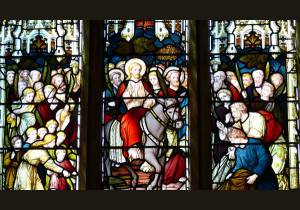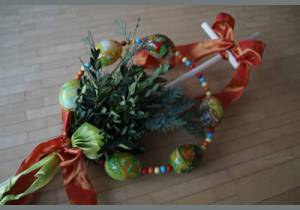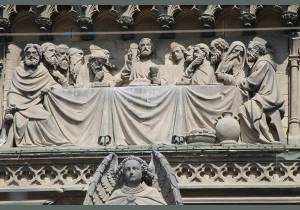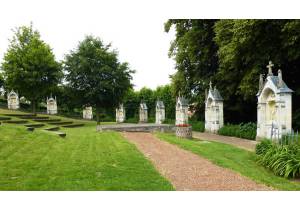Celebrating the Holy Week in Germany: dates, celebration, conventional congratulations, greetings, traditions and customs on the Holy Week and Good Friday
On this page you will find a description of the Holy Week festivities in Germany. Celebration dates by year, customs and traditions common for Germany on the Holy Week, a description of the origin, congratulations & greetings.
Dates for the Holy Week celebration in Germany
The date of the Holy Week celebration in Germany changes every year.
The Holy Week celebration date in Germany:
Sunday 29 March 2026 .
Below is a list of dates for celebrating the Holy Week in Germany by year, provided that in previous and subsequent years the present practice and time of the holiday celebration is preserved:
- Sunday, 13 April 2025 - Holy Week 2025Germany Germany
- Sunday, 29 March 2026 - Holy Week 2026Germany Germany
- Sunday, 21 March 2027 - Holy Week 2027Germany Germany
- Sunday, 25 March 2029 - Holy Week 2029Germany Germany
Good, Great or Holy Friday during the Holy Week is a national public holiday in Germany and is observed a follows:
- Friday, 18 April 2025
- Friday, 3 April 2026
- Friday, 26 March 2027
- Friday, 30 March 2029
Related holidays
- Good Friday, 3 April 2026
- Yew Sunday, 29 March 2026
- Holy Thursday, 2 April 2026
- Holy Saturday, 4 April 2026
Other names of the holiday
Holiday name in German: Karwoche.
Other names for the Holy Week in Germany:
- Maundy Week
- Passion Week
Holiday status in the territory of Germany
Holy Week is not an extra non-working day in Germany.
Good, Great or Holy Friday during the Holy Week is a national public holiday and an extra non-working day in Germany.
Wishes and congratulations, greetings on the Holy Week in Germany
No information available.
Description of the Holy Week celebration: customs and traditions:
Holy or Passion Week (in German: Karwoche) is the last week of the 40-day Great Lent, which begins with the Ash Wednesday (in German: Aschermittwoch). It is also a week of bereavement, mourning before Easter (in German: Ostern). It starts on the Sunday preceding Easter and ends on the Saturday, which is the Easter Eve.
The name "Kar" comes from the old German word Chara and means: mourning, sorrow, grief. At this time, believers mark three events at once: the Sufferings, Death and Resurrection of Christ.
Some days of this week have a specific name and meaning; for more information, see the table below:
- Palm Sunday (in German: Palmsonntag) - the Holy Week beginning
- Monday - Wednesday - quiet days
- Maundy or Holy Thursday(in German: Gründonnerstag) - the Last Supper
- Good or Holy Friday (in German: Karfreitag) - Death of Christ
- Great or Holy Saturday (in German: Karsamstag) - the Holy Week last day
What follows is a description of each day, their meaning and customs.
Palm Sunday or Yew Sunday
Palm Sunday is the beginning of the Great Week or Holy Week. This day is a day to remember Jesus' triumphal entry into Jerusalem riding a donkey. The people greeted him by spreading clothes on the road and welcoming him with palm leaves.
In countries where palm trees do not grow, on this day people cut the branches of trees, for example, willow (osier), evergreen and other trees and make bouquets or a palm pole (in German: Palmstange) out of them beautifying them with ribbons, eggs, flowers, fruits, pastries, and other decorations. On this day, worship services and church processions are held with young people and children participating.
Like many other holidays, over time, Palm Sunday has acquired traditions and superstitions that have nothing to do with Christ. For example, palm branches and bouquets are believed to protect the home from all evil. Branches are burned for the same purpose. People also decorate branches and even whole trees with painted eggs.
Another feature of Palm Sunday is Confirmation - in Protestant churches on this day young people of 13 to 15 years old celebrate the end of their religious education and are received into Churches as adult believers.
Maundy Thursday or Holy Thursday
Maundy Thursday of the Holy Week, in German - Gründonnerstag (Green Thursday). The name Gründonnerstags has evolved over time, while originally the day was called Greindonnerstag, which was translated as the Day of the Weeping or Whining.
On this day Christ is believed to have had the last supper with his disciples, marking the Passover.
On this day, worship services are held in churches, after which church bells are silenced until Easter. Earlier that day, people excommunicated on Ash Wednesday were restored to the churches; this tradition has its manifestations in the modern rites of this day.
This day also has a lot of traditions and beliefs unrelated to the Bible, for example: making wreaths of flowers decorated with eggs; eating green dishes, dishes made from green vegetables and herbs.
Good Friday or Holy Friday
This day is considered the day of Christ's death, therefore it is regarded as a day of mourning and a day of fasting. By 3:00 p.m., the time considered to be the time of Christ's death, parishioners gather in churches. On this day, the Way of the Cross (in German: Kreuzweg) service takes place.
Earlier on Good Friday, people did not drink anything, the children received as a gift cookies baked in the form of the alphabet letters and a Good Friday chicken egg, for good studies, which began after Easter.
Great Saturday or Holy Saturday
Holy Saturday is the last day of the Holy Week and the day of preparation for the Easter celebration. This is a day of silence and prayer, dedicated to the Christ's burial remembrance. It ends with an Easter bonfire.
On the night of Saturday into Sunday, church services are held and the Holy Saturday traditions are observed. In the church courtyard, a fire is built, from which the traditional candle, the Paschal, is lit, wherefrom the believers in the temple light their candles. Also earlier on this night, adults used to be baptized.
The origin of the Holy Week holiday
The Passion Week or the Great Week is a time in which believers remember the difficult days experienced by Jesus Christ before his death and his very death.
However, most of the church traditions that are observed at this time do not refer to the Christ lifetime, yet, have originated from popular superstitions and customs.
Photos, pictures for the holiday
To enlarge and view the picture, click on it with the mouse button.
-

Stained-glass window featuring the scene of Christ's Entry into Jerusalem, Palm Sunday events
-

Palm pole decorated with eggs and branches, made and used on Palm Sunday
-

Fresco depicting Christ's last supper with the disciples, Holy Thursday events
-

Way of the Cross in the Catholic Church commemorating Christ's suffering, Good Friday events
RU-GELD.DE Team
Last updated:



